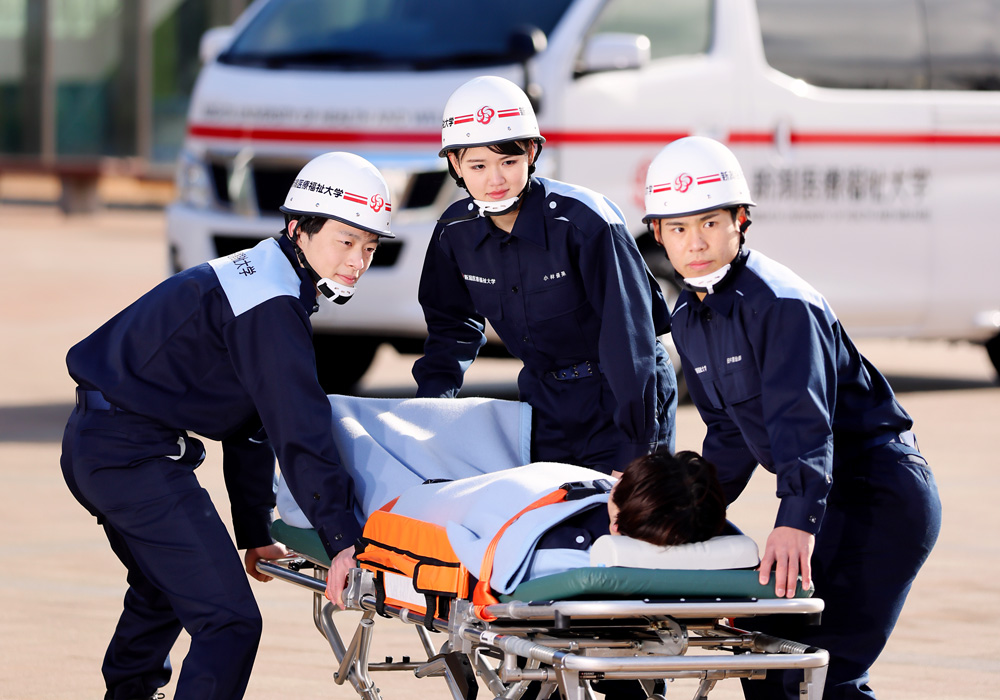
Objectives
The major purposes of this course are:
- To acquire a paramedic license, and
- To pass the employment examination for public servants in response to the requests of students.
Characteristics of the Curriculum
A paramedic is a healthcare professional in the pre-hospital setting, working mainly at a fire station as a member of the ambulance crew.
In Japan, paramedics are authorized to perform the following procedures during resuscitation in accordance with the physician's instructions:
- The use of suprapharyngeal airway devices, and
- Ringer’s lactate infusion.
Specially trained/certified paramedics can use the tracheal tubes under limited indication criteria to patients with cardiac arrest since July 2004, and the intravenous adrenaline or epinephrine since April 2006. Recently, they can also use glucose solution to hypoglycemic patients and Ringer’s lactate infusion to patients in a state of shock. At all fire departments, each ambulance is usually boarded by three or more emergency medical technicians, including at least one paramedic.
Through our curriculum, therefore, students are required to acquire such technical skills and emergency medical knowledge of medical practice implementations. In addition, they must be able to properly determine a hospital that accepts an emergency patient.
Qualifications and Careers
In order to obtain a paramedic license, students need to pass the national exam, and if they want to become public servants such as firefighting officials, they need to pass the employment examination for public servants.
International Activities
Our course will provide students with opportunities to attend overseas training programs and have hands-on experiences at emergency institutions such as fire stations and ambulance companies in Los Angeles, California, and other countries. We strongly believe it is truly helpful for students to compare paramedic systems of Japan and other countries.
Diploma, Curriculum and Admission Policies (Department of Emergency Medical Sciences)
| STEPS Abilities and attitudes of qualified QOL supporters |
Diploma Policy NUHW grants a bachelor's degree to the students who have acquired the following abilities and attributes. |
Curriculum Policy NUHW implements the curriculum as follows in order to help students develop into competent QOL supporters. |
Admission Policy NUHW seeks students who have the following abilities and attributes. |
|
|---|---|---|---|---|
| S | Science & Art Ability to utilize scientific knowledge and skills in academic discipline |
Abilities to utilize their advanced scientific knowledge and skills in emergency life-saving | Our curriculum provides specialized basic subjects. Our curriculum also provides specialized major subjects according to the school grade. In the practice of the curricula, support according to the characteristics of each student is provided. The learning outcome is evaluated based on the national exam passing rate and qualification acquisition rates. | Basic knowledge equivalent to high school graduation for subjects such as English, Japanese and mathematics, to be imposed in the entrance examinations |
| T | Teamwork & Leadership Ability to work together as a team and to show leadership qualities |
Abilities to demonstrate global leadership as emergency life-saving technicians to perform professional duties for interprofessional collaborative practices | Our curriculum provides: a) a cluster of subjects related to health, medicine, welfare, and liberal arts in which students from various departments learn together; and b) specialized subjects including the Clinical Practices. The learning outcome is evaluated based on the achievements of the subjects: Interprofessional Seminar II and Clinical Practices. | Ability to express own ideas properly and to communicate and cooperate with others. |
| E | Empowerment Ability to support clients by giving them powers to promote QOL |
Abilities to contribute to the globalized society by promoting clients' QOL with respect and suppor for their diverse backgrounds | In order to foster a wide range of cultures and grounding to empathize with and support the clients, the curriculum provides a cluster of subjects related to health, medicine, welfare, and liberal arts, along with another cluster of subjects where these issues are learned interrelatedly. In order to acquire the ability to work as emergency life-saving technicians in communities and societies, the curriculum provides specialized subjects. The learning outcome is evaluated based on the achievements of the relevant subjects by OSCE (Objective Structured Clinical Examination) and Clinical Practices | Attitude to cooperate with others with a compassion for people, together with the attitude to actively learn and act on their own |
| P | Problem-solving Ability to find ways of solving problems and propose better solutions |
Abilities to make accurate judgment in various situations based on scientific assessment in emergency life saving. | Our curriculum provides classes in a seminar format. In the classes, through active learning in individuals and small groups based on PBL (problem-solving learning), students experience a series of processes including problem raising, problem solving by logical thinking, and, summary and presentation of the course. The learning outcome is evaluated based on the achievement of Research Practicum II. | Abilities to think in a multifaced manner from a logical viewpoint for making a reasonable judgment on an event |
| S | Self-actualization Attitude towards the fulfillment of his/her potential |
Attitude to maintain interests in wide-ranging issues in their professional fields and local communities to contribute as part of their lifelong learning | Our curriculum provides specialized subjects including subjects in seminar format throughout the four years. The learning outcome is evaluated based on the exam of relevant subjects and the achievement of seminar classes. | High motivation to contribute to the local community through activities at the front of emergency situations and disaster sites as an emergency life-saving technician with an interest in emergency medical care and disaster prevention |
| Remarks | Refer to University Regulations, Article 1 | Refer to School Manual(Gakusei Binran) | Refer to Guidelines for Applicants(GakuseiBoshu Yohko) | |
| Degree to be awarded | Bachelor of Emergency Medical Sciences | |||
Notes: "STEPS" is a acronym formed from the words, which represent "the five requirements" for qualified QOL supporters.
NUHW stands for Niigata University of Health and Welfare.

